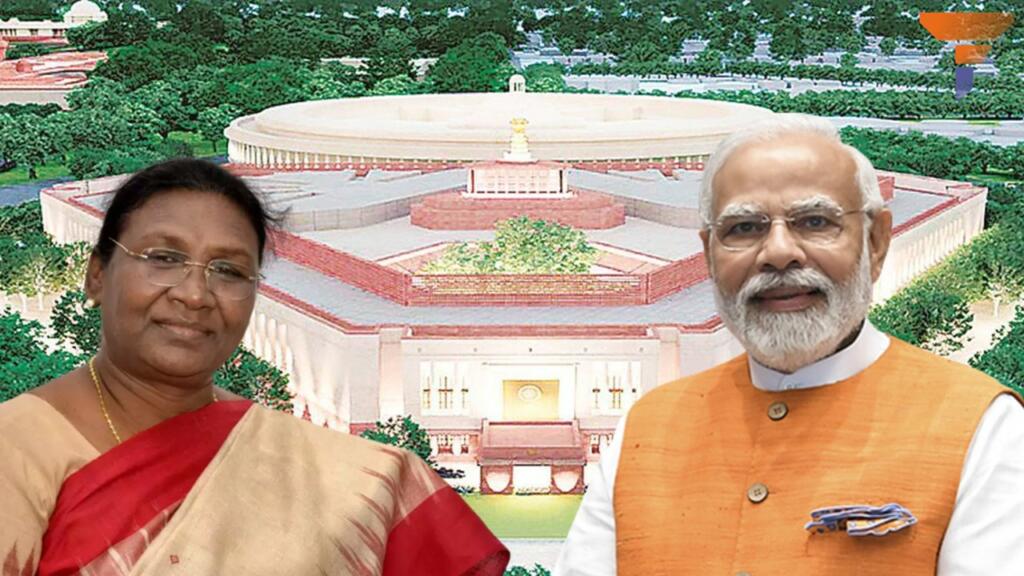New Parliament inauguration: As the winds of change sweep across the Indian subcontinent, a pivotal transformation is underway. The Parliament of India, an iconic institution inherited from the British Era, is being superseded by a more contemporary and practical structure. The one to inaugurate this architectural marvel on the 28th May 2023 will be none other than Prime Minister Narendra Modi. Amidst the political hullabaloo surrounding this transition, there exists a need to delve into the existing structure, the new Central Vista, and the ensuing controversy.
The existing Parliament of India, a timeless edifice, has been a symbol of India’s rich democratic legacy. Shaped in a circular form, inspired by the Ashoka Chakra, it was designed by the British architects Sir Edwin Lutyens and Sir Herbert Baker in the 1920s. Since then, it has served as a crucible for India’s democratic journey, bearing witness to numerous pivotal decisions and landmark debates that have shaped the nation’s socio-political landscape. Over the years, it has withstood the trials of time, but the demands of a burgeoning democracy necessitate its modernization.
The Central Vista Project, into which the new Parliament building is incorporated, represents an ambitious undertaking designed to rejuvenate India’s governmental infrastructure. This massive project includes the construction of new ministry complexes alongside the Parliament, thereby expanding the operational capabilities of the government. It’s a testament to India’s commitment to enhancing the efficiency and efficacy of its democratic operations.
Yet, this monumental endeavor has not been immune to criticism. The opposition parties have voiced their disapproval, criticizing the perceived extravagance of the project, the transparency of the procurement processes, and potential environmental repercussions. While any large-scale project is open to scrutiny, the discourse should be grounded in constructive criticism rather than politically motivated obfuscation.
New Parliament inauguration
As we approach the inauguration of the new Parliament building, the opposition has found a new bone of contention. There is an outcry over Prime Minister Narendra Modi, rather than President Draupadi Murmu, inaugurating the new Parliament. This, they argue, is evidence of the Prime Minister’s so-called megalomania.
Yet, a careful examination of the facts and a basic understanding of India’s political structure would dispel these allegations. India follows a parliamentary system of governance, wherein the Prime Minister is the head of the government, and the President is the head of the state. The Parliament, where representatives elected by the citizens of India gather, forms the crux of the country’s democratic machinery.
The Prime Minister, as the leader of the majority party, is chosen by these representatives, thereby symbolizing the will of the people. As such, it is both legally and morally acceptable, even fitting, for the Prime Minister to inaugurate the new Parliament. It represents the arrival of a new chapter in India’s democratic saga, one that the Prime Minister, as the people’s representative, should rightfully usher in.
In contrast, the President of India, despite holding the highest constitutional post, plays a predominantly ceremonial role in the country’s governance. If a new Presidential residence were to be constructed, it would be entirely appropriate, even expected, for the President to inaugurate that building.
The opposition’s claims of the Prime Minister superseding the President’s rights, hence, appear to be more of a politically orchestrated drama than an issue rooted in constitutional propriety. Misplaced outrage and allegations only muddy the waters of the democratic discourse and detract from the fundamental principles of a healthy democracy: deliberation, discussion, and decision-making.
Understanding the intricate constitutional fabric of India, the roles and responsibilities of the Prime Minister and the President, is crucial. Conflating the two for political gains or exploiting the situation to stir controversy does little to strengthen our democracy. It only underscores the necessity for political maturity and a well-informed citizenry.
As India prepares to step into a new era with the inauguration of the refurbished Parliament, the focus should ideally be on enhancing democratic processes, promoting inclusive growth, and respecting the sanctity of the institutions that have stood as pillars of our democracy.
The transition to the new Parliament symbolizes the evolution of our democracy, reflecting the aspiration for modernity and practicality while staying rooted in the democratic ethos. It’s time we let the essence of democracy, rather than political one-upmanship, take the center stage. After all, the Parliament is not just a building; it’s a beacon of the people’s hopes and aspirations, an embodiment of our democratic ideals.
